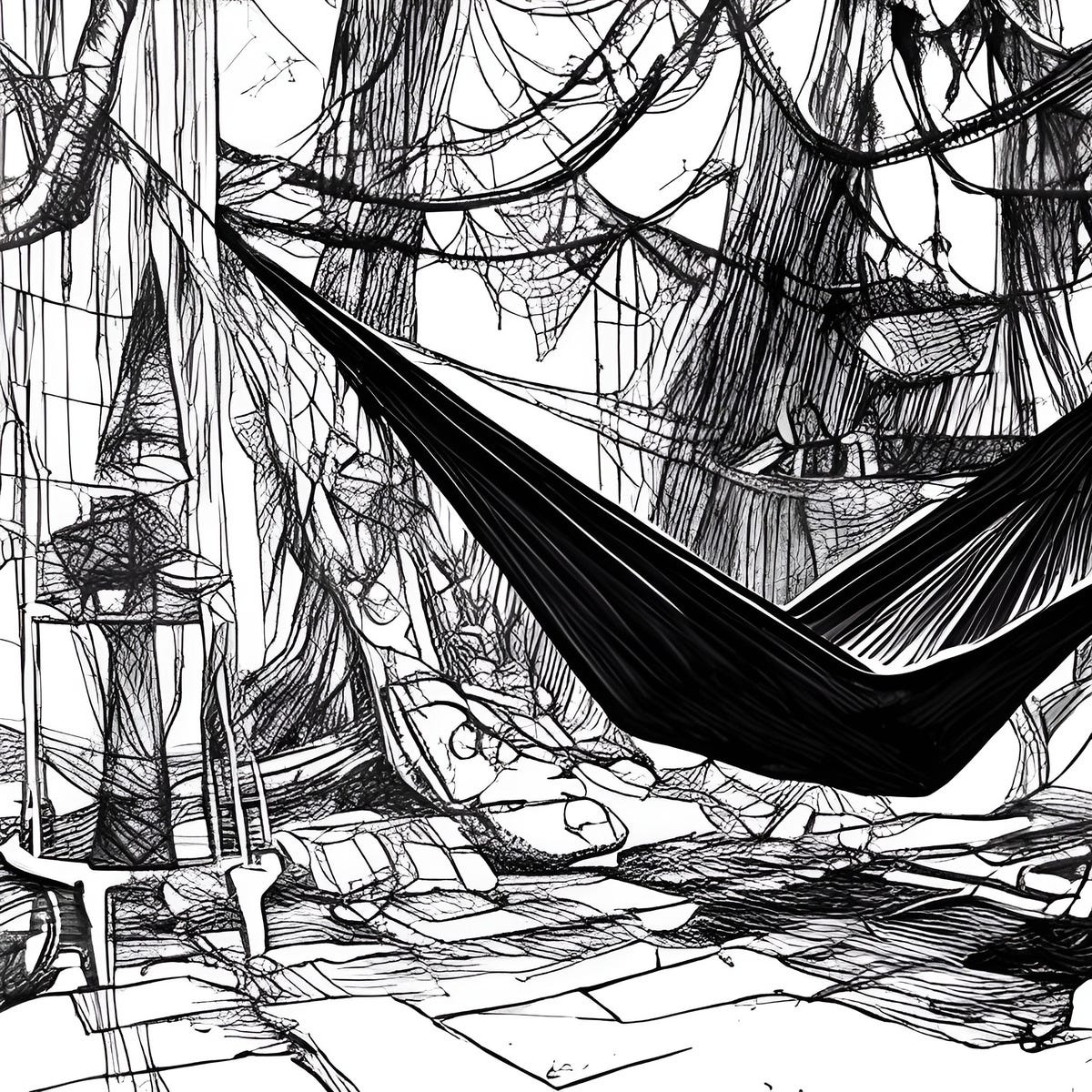Episode One - and the devil died screaming - restless desire
Ultra-High Season One: A cyberpunk / dystopian fantasy through a Lacanian poetic lens
I reclined in my hammock beneath a silent, indifferent sky, my laptop’s pale glow the only testimony to my restless scribblings. Each keystroke trembled with a desire I could not name—an anguished beckoning from some hidden recess of the subject, eager to breach the borders of the symbolic and spill into language. A slender joint hung at the corner of my lips, its slow, curling smoke a gauzy veil that dissolved the line between escape and entrapment, as though the haze embodied my jouissance, my unspoken yearning for release.
Then a voice—soft as a half-remembered dream, insistent —sliced through the clack of keys like a shard of ice. My heart fluttered, and I searched the dim space for its origin, half-tempted to believe the haze had conspired to birth phantoms of my own making. This voice, bearing the weight of some spectral Other, pressed against my thoughts, demanding its own place in the symbolic order I was hastily constructing. My fingers continued their erratic dance, compelled by the breach of an old wound that refused to be sealed.
A second whisper, fleeting as a wisp of regret, declared that this tumult was no longer mine alone. In the flicker of screen-light and drifting smoke, I perceived it—an accursed skull, the devil’s relic, lying forsaken on the floor. Its cracked grin, its sulfurous stench, summoned from the Real a memory I had long exiled: a chapter rife with anger and despair, repressed but never entirely vanquished. In that decay I glimpsed my own mirrored other—the split subject, haunted by secret transgressions.
Defiance and dread surged in unison. I had once banished this voice deep into the unconscious, a violent foreclosure of my guilt. Yet here it stood, unbidden, my objet petit a demanding recognition. I drew in the acrid smoke, letting it mingle with the adrenaline that pulsed through me, igniting a silent war between the lure of oblivion and the terror of being consumed by my own unavowed guilt.
Words became weapons in a surreal parley. “Humans have only heard her side of the story,” the voice intoned, echoing the fractures in my self-image. I offered no preamble—only a terse rejoinder, my tone thick with the residue of sleepless nights and psychic scarring. My gaze drifted to an empty glass of gin, its reflective surface a cipher for the countless moments I’d oscillated between rebellion and surrender.
Thus began our spectral debate, theology and myth entangling with the weight of personal remorse. With each retort I challenged the fixed narratives of gods and devils, even as I confronted the truth that I embodied both the capacity to create and to destroy. “I do not follow faith blindly,” I declared, each syllable quivering with a newfound insistence on agency. The very sound of those words carved out a sliver of freedom from the symbolic cage of my past.
The voice, ever mocking, held up my unrest as a funhouse mirror. “Are you trying to become your own god?” it sneered, prodding the raw edges of my anger until my knuckles ached. I spat back that I was a pagan—an avatar of rebellion born from loss and fierce contempt for a system that promised liberation yet delivered only servitude. Our exchange spiraled, weaving bitter philosophy with personal vendetta, until my subjectivity trembled—poised on the precipice between violent rupture and the quiet hope of integration.
In the lull that followed, the conversation shifted toward a collective hallucination: the dream of Ultra-High, that siren song of boundless possibility. I remembered the mass surrender to its lie, the way it ensnared us in a cycle of manipulation whose threads reached into every corner of the symbolic. In that recollection my soul quivered—the realization that my struggle was not only against a phantom demon but against the very scaffolding of a broken reality.
Later, seated on my porch, London Grammar’s “If You Wait” drifted through the night like a lullaby for fractured souls. Under that unfeeling canopy, I felt the residue of every choice I’d ever made. I vowed, then and there, that I would no longer allow these internal phantoms—their verdicts and torments—to dictate the trajectory of my creation. I had descended into darkness before and emerged, if fractured, reborn. Tonight, fortified by a fierce, conflicted resolve, I promised to wage this battle on my own terms—until both my past and its relentless echoes could finally rest at peace.
This episode is an experiment in Ai story art adapted from my original episode on my website listed below. I have taken the original version and put it through a more intense, poetic Lacanian lens using high tech, Ai, then editing and rewriting the results as low life, human.
Please check back as I use Ai to rewrite the posts on this substack through a Lacanian psychoanalytic, almost poetic, lens. This experiment should be fun, and I think somewhat insightful.


